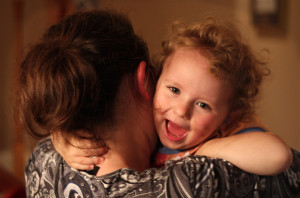 How much do parents matter? Well, oddly it’s a question that has been asked and answered in so many different ways, it’s difficult to tell. On one extreme, we have the likes of Judith Harris who argued that peer relationships are far more important than any parental relationship, especially later in adolescence. On the other, we have the likes of Gordon Neufeld who believes parents are central to their children’s long-term well-being.
How much do parents matter? Well, oddly it’s a question that has been asked and answered in so many different ways, it’s difficult to tell. On one extreme, we have the likes of Judith Harris who argued that peer relationships are far more important than any parental relationship, especially later in adolescence. On the other, we have the likes of Gordon Neufeld who believes parents are central to their children’s long-term well-being.
The research tends to fall somewhere in the middle. Two main lines of thought have been that either parents directly influence their children in the younger years and the older years OR they directly influence their children in the younger years, but that children adapt to these influences and they cease to be significant. The agreement on the early years is because of a wealth of research that has shown us that yes, us parents are hugely influential, especially in the first three years of our children’s lives
Back in 2013, one large study examined these two pathways and found that parents actually matter both in the short-term and in the long-term (i.e., adolescence), directly speaking[3]. Specifically, the focus was on maternal sensitivity, which encompasses the all-important responsiveness to distress and following a child’s lead, and greater maternal sensitivity predicted both better social and academic well-being. (What is maternal sensitivity? In short, think of a sensitive parent who follows their child’s cues in terms of how to respond and you’ve got maternal sensitivity.)
However, as people know, one study – no matter how big – often isn’t enough to conclusively state that one model or one theory is better than another. New research in Child Development tackles this issue again by replicating the previous work only including higher-risk families in the equation and extending the work into adulthood instead of just adolescence[4]. This serves to estimate the effect of parenting in those where we imagine it may matter more because of being at risk for greater disadvantage, but also looking at the effects into adulthood, a time when we don’t tend to think of our parents have that great an influence.
Notably, these researchers (from various institutions including the University of Minnesota, University of Delaware, and University of Illinois at Urbana-Champaign) included transactional effects in their models. This means they estimated the effect of a child acting in a way that influences the environment which then acts back upon the child. It’s one way to try and include the fact that the way a child engages with the world is likely to influence what the child experiences.
The families of interest were from the Minnesota Longitudinal Study of Risk and Adaptation and the children were born between 1975 and 1977. The current sample is a subset of this group, 267 individuals, for whom data on maternal sensitivity in the first 3.5 years was available. The sample was higher risk in that nearly half of the children were born to teenage mothers, more than half were single mothers, and nearly half had completed less than high school education. The majority of the sample was White/non-Hispanic (65%), 16% were multiracial, 14% African American, and 5% Other.
Using videotaped interactions at various time points and a self-report measure of sensitivity (devised by Mary Ainsworth, one of the key players in assessing attachment) to assess maternal sensitivity, teacher ratings to assess social competence through age 16, structured interviews to assess romantic relationship competence as a proxy for social competence in adulthood, various intelligence or subject tests for academic competence in childhood, years of education for academic competence in adulthood, and various demographic variables as controls, the various models were evaluated for how well they fit the data. The two models of interest were (1) enduring effects, in which early maternal sensitivity continues to directly affect well-being into adolescence and adulthood, and (2) revisionist, in which children adapt to the early effects and they cease to have later effects (outside of the early effects).
According to this data, there was further support for the enduring effects model, especially for academic outcomes. This means that early maternal sensitivity directly influences children’s academic well-being not only in childhood, but adolescence and adulthood as well. This held up when controlling for potential demographic confounds and transactional processes, meaning that mothers (in this case) didn’t just create a good feedback system, but their early sensitivity continued to influence well-being for years on top of this feedback system.
When looking at social competence, there was a direct effect of maternal sensitivity in the basic model and when transactional effects were included. However, when demographic confounds were included, the enduring effects model was indistinguishable from the other, revisionist model. This would suggest that for this high-risk group, there are direct effects of maternal sensitivity in young childhood, but that as children adapt to this sensitivity, it ceases to have a direct effect and other enduring variables, like SES, exert stronger influences.
Why the stronger relationship with academic success? Well, in part it may have to do with the assessment herein. The focus was on how parents read their child’s cues to problem solving in the videotaped segments and this is likely to be more directly relevant for academic success than social competence. A further assessment using responsiveness to distress as the key variable for sensitivity might yield different results.
Notably, the data cannot speak to whether this long-term effect is due to stability in maternal sensitivity over the years; however, it seems unlikely for two reasons. First, the data herein goes to adulthood in which we would not expect to see direct effects as children are not living at home and likely haven’t for many years. Second, the 2013 analysis actually did include a later measure of maternal sensitivity and it resulted in a poorer fit to the data, suggesting the effects are directly related to early maternal sensitivity.
What do we take home? Considering the data herein and that of the 2013 study, there is far more support for an enduring effects model of maternal sensitivity than one which doesn’t see enduring effects. However, the effects of SES cannot be ignored.
For higher-risk children, we need to focus on the effects of poverty on their well-being. Oddly, most people think that parenting is key to overcoming the effects of poverty, yet the data herein only partially supports that. Academically, yes, good, sensitive parenting can help children achieve beyond what would be expected given their socio-economic standing. Socially, however, the effects of poverty remain and must be addressed as even highly sensitive early parenting cannot overcome them.
For lower-risk children, parenting, namely sensitive parenting, is quite critical to their well-being in the short- and long-term. Again, it’s odd that we tend to not focus on parenting in higher SES groups, with the belief that the privileges afforded by a higher socio-economic standing will somehow level the playing field despite parenting. Yes, the privileges clearly do influence well-being, as we can see when comparing the lower and higher-risk groups, however, parenting still mattered greatly for those in the lower-risk group and this should not be ignored.
Taken together, we need to focus on both increasing maternal sensitivity in order to better our children’s outcomes and work to eliminate the negative influences of lower SES on child long-term well-being if we want to help children succeed. Our children deserve and need the benefit of good economic stability and good, sensitive parenting in order to thrive.
To read more on sensitive parenting and attachment theory, check out the following books:
[amazon_image id=”1848726821″ link=”true” target=”_blank” size=”medium” ]Patterns of Attachment: A Psychological Study of the Strange Situation (Psychology Press & Routledge Classic Editions)[/amazon_image] [amazon_image id=”1933653388″ link=”true” target=”_blank” size=”medium” ]Theories of Attachment: An Introduction to Bowlby, Ainsworth, Gerber, Brazelton, Kennell, and Klaus[/amazon_image] [amazon_image id=”0415354811″ link=”true” target=”_blank” size=”medium” ]The Making and Breaking of Affectional Bonds (Routledge Classics)[/amazon_image] [amazon_image id=”0465075975″ link=”true” target=”_blank” size=”medium” ]A Secure Base: Parent-Child Attachment and Healthy Human Development[/amazon_image] [amazon_image id=”1593853815″ link=”true” target=”_blank” size=”medium” ]Attachment from Infancy to Adulthood: The Major Longitudinal Studies[/amazon_image]___________________________________
[1] Repetti RL, Taylor SE, Seeman TE. Risky families: family social environments and the mental and physical health of offspring. Psychological Bulletin 2002; 128: 330-66. [2] Grossman KE, Grossman K, Waters E. Attachment from infancy to adulthood: The major longitudinal studies. New York, NY: Guilford Press, 2006. [3] Fraley RC, Roisman GI, Haltigan JD. The legacy of early experiences in development: Formalizing alternative models of how early experiences are carried forward over time. Developmental Psychology 2013; 49: 109-25. [4] Raby KL, Roisman GI, Fraley RC, Simpson JA. The enduring predictive significance of early maternal sensitivity: social and academic competence through age 32 years. Child Development 2015; 86: 695-708.





[…] Guess What? Parents Do Matter to Child Well-Being (and Not Just When They’re Kids) | Evolutionary …. […]
[…] (1) Un article et quelques références […]
[…] Hoe ga ik om met mijn boze, om zich heen slaande kind? – KROOST. Guess What? Parents Do Matter to Child Well-Being (and Not Just When They’re Kids) | Evolutionary …. […]
i found harris’ book to be a profound eye opener that resonated with my observations. i’ve been trying to find a critical assessment that describes evidence against it, but haven’t found any. i’m surprised that you offer these studies as contradicting her theory, as they have the exact flaw she pointed out in the field, namely not controlling for genetic heritability, in this case of sensitivity. have you read her book? i strongly encourage you to do so and would be very interested in your response including the strongest evidence in the literature that either does control for heritability or establishes why doing so is not critical to the question.